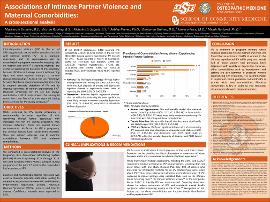| dc.contributor.author | Enmeier, Mackenzie | |
| dc.contributor.author | Robling, Kristyn | |
| dc.contributor.author | Sajjadi, Nicholas B. | |
| dc.contributor.author | Keener, Ashley | |
| dc.contributor.author | Greiner, Benjamin | |
| dc.contributor.author | Price, Jameca | |
| dc.contributor.author | Hartwell, Micah | |
| dc.date.accessioned | 2023-09-12T16:44:51Z | |
| dc.date.available | 2023-09-12T16:44:51Z | |
| dc.date.issued | 2022-02-18 | |
| dc.identifier | ouhd_Enmeier_associationsofintimatepartner_2022 | |
| dc.identifier.citation | Enmeier, M., Robling, K., Sajjadi, N. B., Keener, A., Greiner, B., Price, J., & Hartwell, M. (2022, February 18). Associations of intimate partner violence and maternal comorbidities: A cross-sectional analysis. Poster presented at Research Days at Oklahoma State University Center for Health Sciences, Tulsa, Ok. | |
| dc.identifier.uri | https://hdl.handle.net/11244/339515 | |
| dc.description.abstract | Background: Intimate-partner violence (IPV) is the act of inflicting physical, sexual, and/or emotional assault with coercive control and is a traumatic experience, the repercussions from which can be exacerbated in pregnant women. While screening for IPV during pregnancy is recommended regardless of risk, identifying clinical factors commonly associated with IPV during pregnancy may improve screening rates. Thus, our primary objective was to examine associations between IPV and maternal comorbidities. | |
| dc.description.abstract | Methods: We conducted a cross-sectional analysis of the Pregnancy Risk Assessment Monitoring System (PRAMS) Phase 8 spanning 2016 through 2019. Bivariate and multivariable logistic regression was used to calculate adjusted odds ratios (AORs) to determine associations between IPV and diabetes, hypertension, depression, asthma, PCOS, anxiety, and thyroid disease. Confidence intervals were reported at 95%. | |
| dc.description.abstract | Results: Over 40% of women experiencing IPV reported a history of depression or anxiety. The odds of experiencing IPV were higher among women with depression (AOR: 3.27; CI: 2.88 - 3.71), hypertension (AOR: 1.49; CI: 1.26 - 1.77), asthma (AOR: 1.22; CI: 1.03 - 1.46), or anxiety (OR: 3.85; CI: 3.43 - 4.33), but were lower in women with thyroid disorders (AOR: 0.49; CI: 0.28-0.84). | |
| dc.description.abstract | Conclusion: Our study identified an increased likelihood of IPV among pregnant women with certain comorbidities. Knowing clinically relevant associations of IPV in pregnant women may increase screening sensitivity among clinicians and in turn, increase the likelihood of receiving supportive care among individuals experiencing IPV. | |
| dc.format | application/pdf | |
| dc.language | en_US | |
| dc.publisher | Oklahoma State University Center for Health Sciences | |
| dc.rights | The author(s) retain the copyright or have the right to deposit the item giving the Oklahoma State University Library a limited, non-exclusive right to share this material in its institutional repository. Contact Digital Resources and Discovery Services at lib-dls@okstate.edu or 405-744-9161 for the permission policy on the use, reproduction or distribution of this material. | |
| dc.title | Associations of intimate partner violence and maternal comorbidities: a cross-sectional analysis | |
| osu.filename | ouhd_Enmeier_associationsofintimatepartner_2022.pdf | |
| dc.type.genre | Presentation | |
| dc.type.material | Text | |
| dc.subject.keywords | PRAMS | |
| dc.subject.keywords | intimate partner violence | |
| dc.subject.keywords | maternal health | |
| dc.subject.keywords | comorbidities | |
